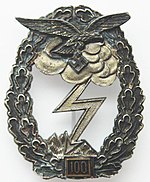Ground Assault Badge of the Luftwaffe
| Ground Assault Badge of the Luftwaffe Erdkampfabzeichen der Luftwaffe | |
|---|---|
 5th grade of the Ground Assault Badge (awarded for participation in 100 combat operations) | |
| Type | Badge |
| Awarded for | Participation in three separate combat operations on separate days by Luftwaffe personnel |
| Presented by | Nazi Germany |
| Eligibility | Military personnel of the Luftwaffe |
| Campaign(s) | World War II |
| Status | Obsolete |
| Established |
|
 Soldier wearing the Ground Assault Badge of the Luftwaffe on the left side of the uniform. | |
| Related | |
The Ground Assault Badge of the Luftwaffe (German: Erdkampfabzeichen der Luftwaffe) was a World War II German military decoration awarded to Luftwaffe personnel for achievement in ground combat. It was instituted on 31 March 1942 by the commander-in-chief (Oberbefehlshaber der Luftwaffe) Hermann Göring.[3]
The badge, designed by the graphic and textile artist Sigmund von Weech (1888–1982), features an oak leaf wreath with at its apex a Luftwaffe eagle, grasping a swastika, flying above a storm cloud, from which a centered positioned lightning bolt strikes trough ground. The general criteria for its presentation was the participation in three separate combat operations on separate days. Luftwaffe soldiers who had already been awarded combat recognition badges of the Heer (German Army), such as the General Assault Badge or the Infantry Assault Badge, were required to exchange their badges for the Ground Assault Badge of the Luftwaffe.[3]
As the war progressed it became necessary to further distinguish those soldiers who had already exceeded the awarding criteria. To accomplish this distinction, Göring instituted four numbered grades on 10 November 1944 based on the number of combat operations. The new badge was changed at its base to incorporate the operations number marking each new grade.[4]
- 2nd grade (II. Stufe) for 25 eligible operations
- 3rd grade (III. Stufe) for 50 eligible operations
- 4th grade (IV. Stufe) for 75 eligible operations
- 5th grade (V. Stufe) for 100 eligible operations
Versions
[edit]-
5th grade
-
1957 de-nazified version
Notes
[edit]- ^ "Bundesministerium der Justiz: Gesetz über Titel, Orden und Ehrenzeichen, 26.7.1957. Bundesgesetzblatt Teil III, Gliederungsnummer 1132-1". German Federal law. Retrieved 2020-09-04.
- ^ "Dienstvorschriften Nr. 14/97. Bezug: Anzugordnung für die Soldaten der Bundeswehr. ZDv 37/10. (Juli 1996)". German Federal regulation. Retrieved 2020-09-04.
- ^ a b Angolia 1987, p. 209.
- ^ Angolia 1987, pp. 209, 211.
References
[edit]- Angolia, John (1987). For Führer and Fatherland: Military Awards of the Third Reich. R. James Bender Publishing. ISBN 0912138149.
- Doehle, Heinrich (2000). Die Auszeichnungen des Grossdeutschen Reichs. Orden, Ehrenzeichen, Abzeichen. (in German). Norderstedt, Germany: Patzwall. ISBN 3-931533-43-3
- Klietmann, Kurt-Gerhard (1981). Auszeichnungen des Deutschen Reiches. 1936–1945. (in German). Stuttgart, Germany: Motorbuch ISBN 3-87943-689-4


